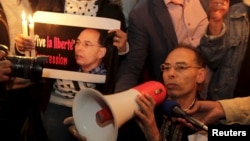Hearings resume this week in the case of seven Moroccan journalists accused of violating national security. Their crime? They helped train citizen journalists to use a smartphone app.
Amnesty International reports that five of the defendants are accused of attempting to compromise citizens’ loyalty to the government and tarnish Morocco’s image. If convicted, they could face five years in prison.
Two are accused of receiving foreign funding to finance “propaganda.”
The Dutch NGO Free Press Unlimited (FPI), active in Morocco for a decade, developed StoryMaker, an open source smart phone application designed to help citizen journalists write, produce and publish professional-grade news reports using Android phones. FPI then partnered with a number of NGOs inside Morocco to provide training in the app’s use.
“Amnesty International is calling on Morocco to drop the charges against these journalists and activists who promoted a secure storytelling app,” said Sirinie Rached, a researcher with Amnesty International. “Moroccan authorities should also amend state security laws that threaten those who criticize the authorities with imprisonment.”
The journalists
Among those appearing in court Wednesday is Maati Monjib, a professor of African studies and political history at the University of Rabat. Monjib is President of the Moroccan Association for Investigative Journalism (AMJI) and a co-founder of Freedom Now, an organization promoting free speech and independent journalism.
On September 16, 2015, officials blocked Monjib from leaving the country when he attempted to attend a conference in Spain. On October 6, he began a hunger strike to protest the travel ban and a week later, he was hospitalized after losing consciousness. Morocco lifted the travel ban on October 29 and formally charged Monjib with harming national security.
Also on trial is Hicham Khreibchi, known more widely as Hicham Al-Miraat, editor and co-founder of Mamfakinch, a pro-democracy citizen media portal created in Morocco during the 2011 protests. He is also founder and former president of the Digital Rights Association and a former advocacy director for Global Voices.
The other defendants are: Abdessamad Ait Aicha (known as Samad Iach), AMJI member and former employee at the Ibn Rochd Center for Studies and Communication; Hicham Mansouri, 35, journalist and former AMJI staffer; Mohamed Essaber/Sber, president of the Moroccan Association for the Education of Youth; Maria Moukrim, journalist and former AMJI president; and retired journalist and AMJI president Rachid Tarik.
“The defendants are currently at liberty pending the outcome of their trial,” Rached said. “They could be locked up at any time if the court decides to overlook press freedoms and convict them.”
Morocco, long touted as a moderate and stable country in North Africa, is a party to the International Covenant on Civil and Political Rights and thus bound to respect the civil and political rights of individuals, including the right to free speech.
The government ushered in some reforms to avert Arab Spring uprisings that took place elsewhere in the region, but have increasingly cracked down on journalists, activists and other critics, especially those funded from outside.




